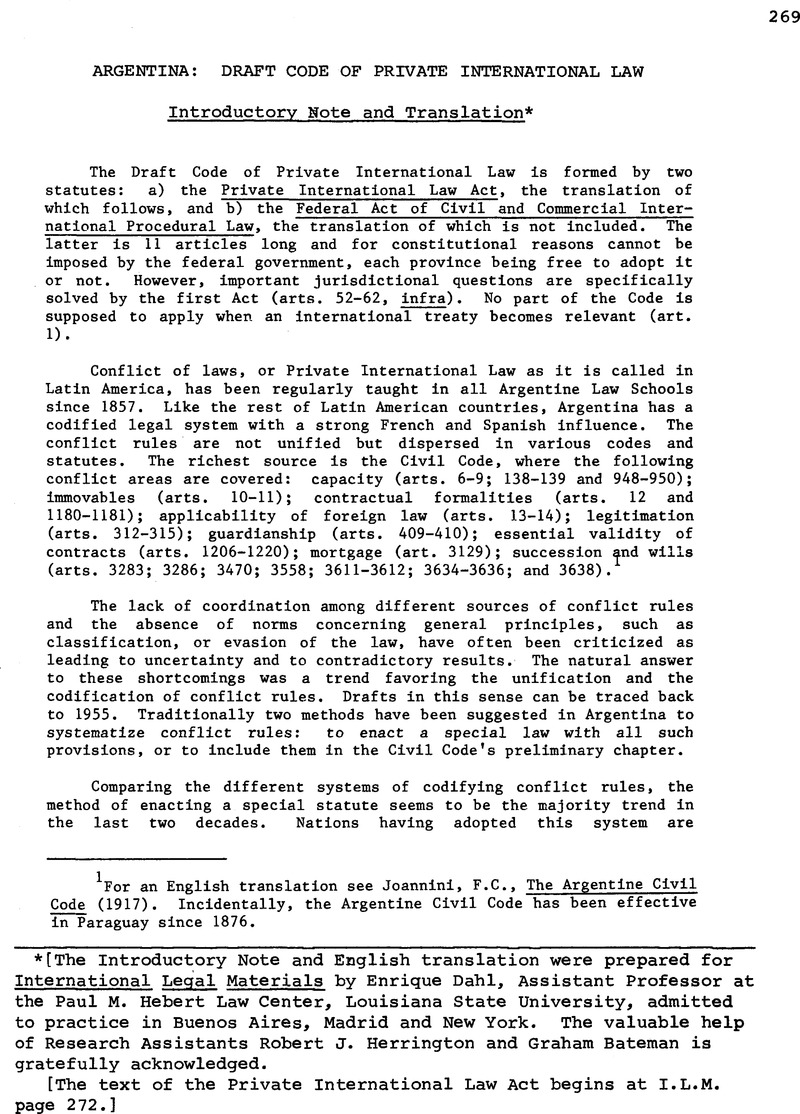No CrossRef data available.
Published online by Cambridge University Press: 04 April 2017

* The Introductory Note and English translation were prepared forInternational Legal Materials by Enrique Dahl, Assistant Professor atthe Paul M. Hebert Law Center, Louisiana State University, admittedto practice in Buenos Aires, Madrid and New York. The valuable helpof Research Assistants Robert J. Herrington and Graham Bateman isgratefully acknowledged.
The text of the Private International Law Act begins at I.L.M. page 272.]
1 For an English translation see Joannini, F.C., The Argentine Civil Code (1917). Incidentally, the Argentine Civil Code has been effective in Paraguay since 1876.
2 An English version of the Montevideo Treaties can be found in 37[Supplement] AJIL 95-157 (1943). In many instances when the Draftfollows the Montevideo Treaties closely, such translation has beenrelied on heavily, but introducing changes in words, syntax or punctionas deemed necessary.
3 The English text of the CIDIP conventions can be found in 14 I.L.M. 325-343 (1975) and in 18 I.L.M. 1211-1247 (1979).
* The source of this provision, article 4 of Law 19.551 has been amended by law 22.917 to read as follows:
"Foreign Bankrupcy. The declaration of bankruptcy abroad is a cause for opening bankruptcy proceedings in Argentina, at the request of the debtor or of the creditor whose payment must must be made in Argentina. Without prejudice to what is established in international treaties, bankruptcy abroad cannot be invoked against creditors, whose credits must be paid in Argentina, to dispute the rights they assert over property in Argentina, nor to vacate transactions made with the bankrupt party.
Plurality of Bankruptcy Proceedings. Bankruptcy having also been declared in Argentina, creditors belonging to the bankruptcy declared abroad can exercise their rights over the remaining assets, once the debts payable in the Argentine proceedings have been satisfied.
Reciprocity. A creditor, whose credit is payable abroad and for which bankruptcy proceedings have not been opened abroad, can only have his credit allowed conditioned to proof that, reciprocally, a creditor whose credit is payable in Argentina can be allowed and collected - under the same conditions - in bankruptcy proceedings opened in the country where such credit is payable.
Equality in Payment of Dividends. The collection obtained abroad of unsecured debts, after the opening of bankruptcy proceedings in Argentina, shall be discounted from the dividends corresponding to general credits due to such beneficiaries."
Translated from Boletln Semanal de Economia, 10/3/83, pp. 2586 and 2587. Paragraph 3 is considered the most important one since it now overturns past decisions that relegated payments to foreign creditors in until all local creditors were satisfied.
The above amendment was enacted on 9/15/83 to facilitate collection in Argentina to foreign creditors. The change is linked to Argentina's huge external debt and consequent pressure from foreign creditors and the International Monetary Fund. The third paragraph is meant to open the doors to foreign creditors giving them equal treatment, but under condition of reciprocity.